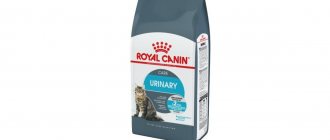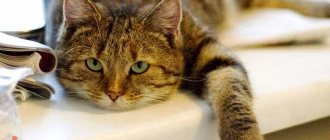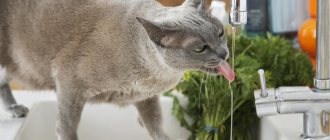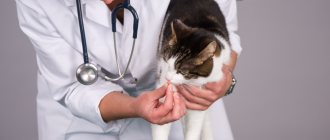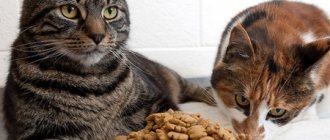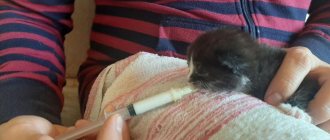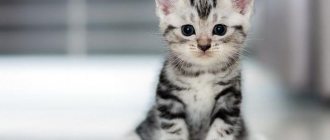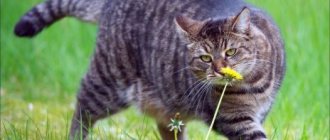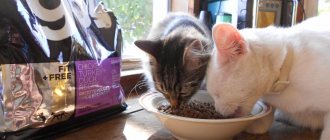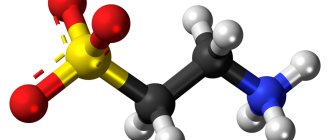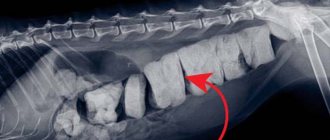If your cat is constipated, treatment should begin with a change in diet. Quite often, in the absence of serious pathologies, this measure is enough to establish bowel movements. The first step is to introduce more fiber-rich foods into your cat's diet. Coarse plant fibers perfectly stimulate the intestines and make them contract.
The basic rules of the diet for constipation depend on the diagnosis. To diagnose it and prescribe appropriate treatment, you must contact a veterinary clinic.
Constipation due to pancreatitis and changing the cat's diet
One of the causes of constipation in a cat may be inflammation of the pancreas - pancreatitis. This disease can occur in isolation, but more often it indicates other gastrointestinal pathologies. The disease is manifested by alternating constipation and diarrhea, vomiting after eating. The cat has a bloated stomach, which also hurts. With this disease, the following feeding rules must be observed:
- exclusion of fatty foods from the diet;
- It is strictly unacceptable to give an animal fried food, especially from the human table;
- milk and dairy products are excluded;
- the bulk of the diet should be meat by-products, as well as fiber-rich vegetables;
- Meat should not be given raw, it must be cooked.
Also read the article about what you should never feed cats.
The doctor also prescribes drug treatment for pancreatitis. The tablets should be given to the cat with food. It is also recommended to conduct a course of vitamin and mineral supplementation.
Intestinal blockage as a cause of constipation and proper nutrition
If the cause of constipation is a blockage in the intestines, this causes great suffering to the cat. As a rule, her stomach is swollen, there is colic, and she vomits after eating. If defecation occurs, it is in small portions and blood impurities may be found in the stool. In such cases, veterinarians recommend an enema, intestinal lavage, and drug treatment. For better fecal movement, you can give your cat a little vegetable oil (2-3 drops per meal). To solve the problem of constipation, it is necessary to make the following changes in diet:
- normalization of the ratio in the diet of BZHU;
- Be sure to include vegetables containing fiber in your diet;
- food should be well chopped, thermally processed, and have a normal temperature.
Cats with these problems definitely need to drink plenty of water.
Diet for obesity as a cause of constipation
If a cat has constipation, not accompanied by other symptoms (vomiting, restlessness, blood in the stool), while she is overweight and moves little, then the reason is obesity. In this case, constipation occurs very often and lasts for a long time, so the cat definitely needs help. It is recommended to do enemas, and it is also recommended to achieve weight loss through diet. Its rules:
- reducing the proportion of simple carbohydrates in the diet;
- The cat should be fed only dietary varieties of meat and poultry (chicken, rabbit, beef, lean veal);
- the meat must be frozen well, and meat by-products must be given to the animal only in boiled form, having previously been scalded with boiling water;
- vegetables should be raw, as heat treatment can increase their calorie content.
An obese cat should be fed frequently, in small portions, so that it does not feel hungry and therefore does not have the desire to overeat. You should also involve your pet in outdoor games and create conditions for him to be active.
We recommend reading the article about a proper cat diet.
When to use a cat laxative
A healthy cat goes to the toilet every day, most often at the same time. If she is no longer young, one bowel movement every 2 days is considered normal. However, there are also young animals with a similar rhythm of going to the toilet; their slow digestion is an individual feature of the body.
Interesting! According to statistics, constipation in cats occurs more often than in cats; laxatives for them are selected taking into account their gender and age.
A caring owner always pays attention to the general condition of his pet and the time of visiting the tray. A change in the cat’s habitual behavior is the first alarm signal. If she is lethargic or, on the contrary, too active, and there is no stool for the third day, you can give her a laxative (for cats a slightly increased dosage of the drug is needed).
Additional signs of constipation are:
- frequent and unproductive visits to the toilet;
- vomiting, appearance of white foam;
- tense stomach;
- attempts to “nest” in secluded corners of the room.
Attention! If, against the background of the above symptoms, a cat develops mucous or bloody discharge from the anus, an urgent consultation with a veterinarian is necessary.
There are times when laxatives are prohibited for a cat. For example, if the animal does not have constipation, but normal stool retention due to malnutrition.
Accidentally swallowed non-food items often cause intestinal blockage, but in this case you should not reach for a laxative. A warm enema, or even better, a visit to the veterinarian, will stabilize the animal’s condition.
The reason for the lack of bowel movements in cats is sometimes not a digestive problem, but an emotional problem, such as stress or an incorrectly chosen place for the toilet. It is enough to calm the frightened pet, move the tray to a secluded place, and everything will work out on its own. In rare cases, a cat is prescribed a course of antidepressants.
Important! Most often, problems with defecation appear in older cats. This is due to a general slowdown in digestive processes, including intestinal motility. In most cases, an animal undergoing sterilization surgery also causes stool retention.
Supplements and Foods to Help Relieve Constipation
In addition to following a diet and taking medications prescribed by your doctor, certain food supplements can help your cat cope with constipation.
Experts recommend introducing magnesium-rich foods into your diet. This element promotes better bowel function by stimulating its contractile movements.
However, owners of neutered cats should remember that excess magnesium in the body significantly increases the risk of developing urolithiasis.
A good laxative is raw chicken liver. Also, with mechanical constipation, you can increase the proportion of fats in the diet for a short period of time. Lipids will make stool softer, making it easier to move through the digestive tract. It is not necessary to introduce fatty meats into the diet; it is better to provide her body with vegetable fats. To do this, add a few drops of olive or flaxseed oil to the food.
Many experts say that pumpkin is a good remedy for constipation. This vegetable contains coarse fibers that stimulate intestinal motility. There is no scientific evidence of the effectiveness of using pumpkin for constipation in cats, but experience shows that this method is safe and works well to cope with stool disorders.
In addition to pumpkin, you can give your cat other vegetables. Usually these animals do not like such food, especially if they are not accustomed to it from an early age. You can introduce vegetables into your diet by gradually adding them to cottage cheese, mixing them into meat dishes and porridges.
For good functioning of the intestinal tract, you can give your cat grass. In nature, they find the plants they need on their own. In an apartment, the pet is offered specially sprouted greens, which can be purchased at pet stores.
Many cats do not refuse sunflower seeds. There is no need to fry them; they should be given raw. You can mix them into food after grinding them first. The seeds contain a large amount of fats and vitamins that will help improve the digestion process.
To treat and prevent constipation, you can give your cat a decoction of flax seeds. This remedy helps both people and cats. The seed must be filled with water and boiled well, otherwise toxic substances will remain in the liquid that will harm the cat.
Bran also helps stimulate peristalsis. Once in the intestines, these products act like a brush, stimulating contractions of the intestinal walls. Wheat or oat bran is added little by little to main dishes.
Features of natural feeding
If your cat is constipated, you should definitely review your diet. If you have this problem, it is recommended to include in your pet's menu:
- Magnesium-containing products. Magnesium normalizes intestinal function, restoring its contractile function. At the same time, owners of sterilized animals should take into account that an excess of this substance in the body of a furry pet significantly increases the likelihood of the formation of stones in the organs of the urinary system.
- Chicken liver. To achieve a laxative effect, this product should be given to the cat exclusively in its raw form.
- Fatty dishes. You need to feed your pet fatty foods, preferably of plant origin, for a strictly limited period.
- Pumpkin. This vegetable improves intestinal motility. In addition to pumpkin, you can introduce other vegetables into your cat's diet. It is recommended to mix them with cottage cheese, porridge, and meat dishes.
- Grass. If your pet lives in a city apartment, you can feed it greens purchased at a pet store. It is better for an animal living in a country house to be given the opportunity to choose the grass itself (provided that constipation occurs in the warm season).
- Sunflower seeds. Crushed raw seeds can be added to any dish. Usually cats do not refuse such a healthy treat.
- Flaxseed decoction. To prepare this natural remedy, boil a mixture of water and flax seeds for 10-15 minutes. The filtered and cooled solution is dropped into the cat's mouth 2-3 times a day.
- Bran. It is recommended to add these products in small quantities to liquid dishes.
In addition to correcting nutrition, it is also necessary to establish your pet’s drinking regime. Insufficient fluid intake is one of the most common causes of this problem. The cat should have access to clean water at any time of the day. If the animal refuses to drink on its own, you can use a syringe without a needle to pour liquid into its mouth.
The role of water in nutrition for constipation
One of the common causes of constipation in cats is dehydration. Evolutionarily, it so happens that cats have almost no feeling of thirst, but they need moisture just like all other living beings. Owners need to ensure that the cat always has access to fresh water.
It is especially important to monitor fluid intake for those who feed their pet dry food.
Cats do not like to drink very much, and if the animal refuses water, then you can pour liquid into its mouth in small portions. This must be done very carefully, making sure that the pet does not choke. For this purpose, you should use a special syringe (or a regular one, but without a needle).
Experts also recommend starting treatment for constipation by increasing the mass fraction of moisture in your pet’s diet. If a cat eats natural food, it usually does not have such problems. But lovers of dry food often suffer from constipation. In such cases, it is necessary to increase the proportion of wet canned food.
The fact is that in cats that constantly eat dry food, especially economy class food, their sugar levels rise significantly due to the excess intake of carbohydrates. The body tries to reduce it through frequent urination, which further increases dehydration.
Why can a cat become constipated?
Veterinarians note that excessive intake of Ca from food supplements and vitamin complexes provokes difficulty in defecation.
Veterinarians identify the following main reasons why a cat may experience constipation:
- Incorrectly selected diet. Eating only dry food leads to difficulty in defecation. With a natural diet, the problem most often arises if you feed the cat only fish and meat, ignoring vegetables, fruits and grains.
- Dehydration of the body. When you don't drink enough water, your stool becomes too dry to move through your intestines.
- Worms. If parasites live in your pet's body, changing the diet and administering enemas will not be effective.
- Formation of strands of connective tissue in the peritoneum. Surgery is needed to remove adhesions.
- Volvulus. The cat will need urgent surgery before necrosis begins in the intestinal tissues.
- Diabetes. To confirm the diagnosis, you need to have your veterinarian check the glucose concentration in your pet's blood.
- Low energy costs. A sedentary lifestyle leads to disruption of the gastrointestinal tract.
- Intestinal obstruction. The syndrome often occurs due to ingestion of large amounts of wool or thread.
- Elderly age. Fecal stagnation is most often observed in cats over 10 years of age, as their intestinal motility is impaired.
Industrial feeds that normalize stool
For constipation, both acute and chronic, veterinarians recommend feeding your cat medicated food specifically designed to solve the problem. The most effective are the following products:
- Royal Canin FIBER RESPONSE;
- Royal Canin GastroIntestinal;
- ShinyCat Hill's;
- Eukanuba Intestinal;
- Hill's i/d;
- Hills Prescription Diet Feline w/d.
These foods contain all the substances necessary for the treatment and prevention of constipation: fatty acids, fiber, vitamins and minerals.
Having identified symptoms of constipation in a cat, the owner should immediately take measures to eliminate it. If the proposed remedies do not help, then you should show the animal to a veterinarian. It is not worth giving cats human laxatives: the dosages of the active ingredients in such medications are not designed for the weight and functioning of the animal’s body. This can only cause harm. You should examine your pet and strictly adhere to the veterinarian’s recommendations.
Composition of food for constipation Royal canin fiber response
Royal is a dry food. It includes :
- Poultry meat;
- Animal proteins;
- Fish fat;
- Egg powder;
- Cereals (corn and rice);
- Soybean oil;
- Yeast;
- Wheat gluten;
- Vitamins (B, C, E);
- Min. substances;
- Folic acid;
- Alimentary fiber;
- Chicory pulp;
- Lutein.
The presence of each ingredient in this cat food is justified and serves three purposes:
- so that the animal is well-fed;
- relieves symptoms of constipation;
- solves problems with digestive disorders and stabilizes intestinal transit.
Natural fats, a complex of antioxidants, fatty acids and plant fiber help soften feces and activate intestinal function.
